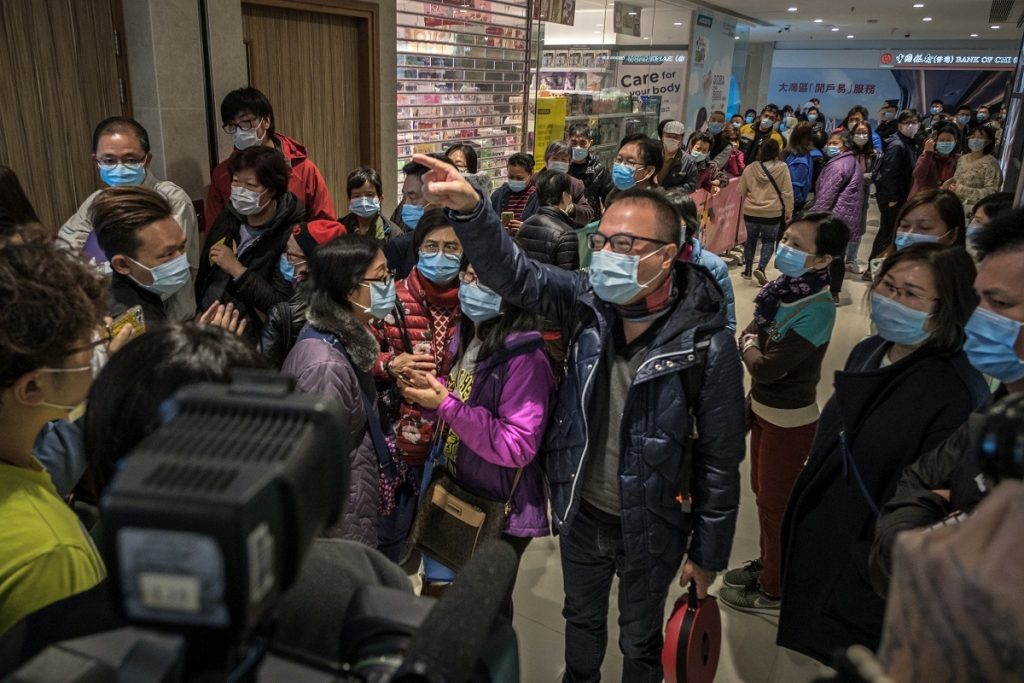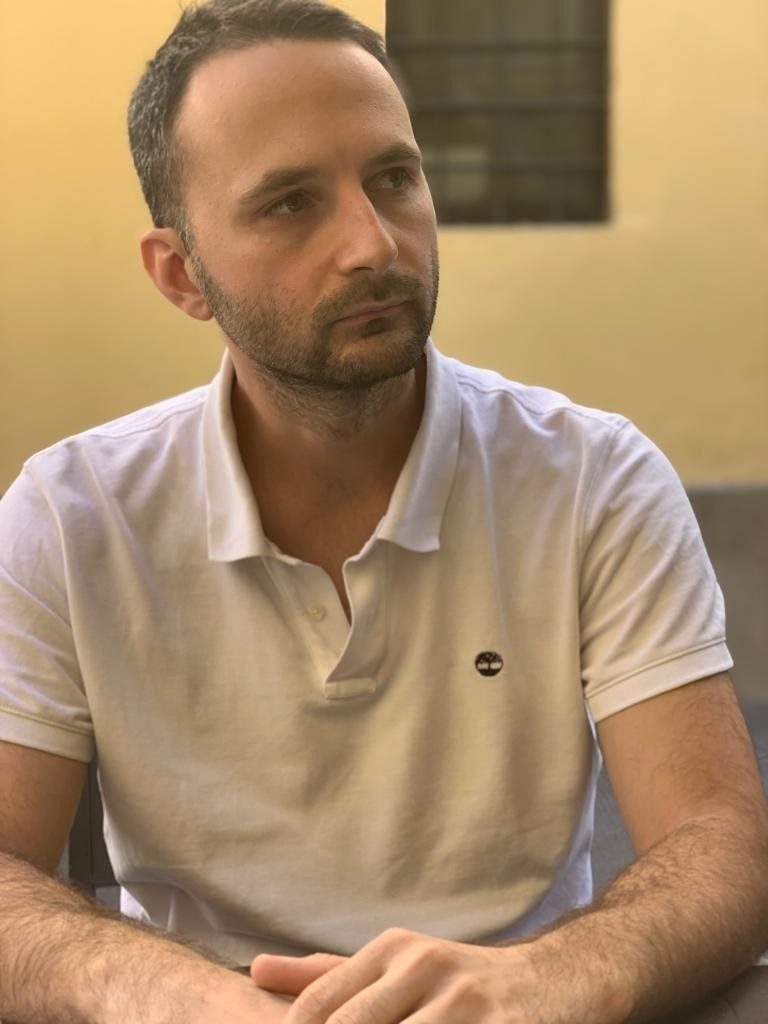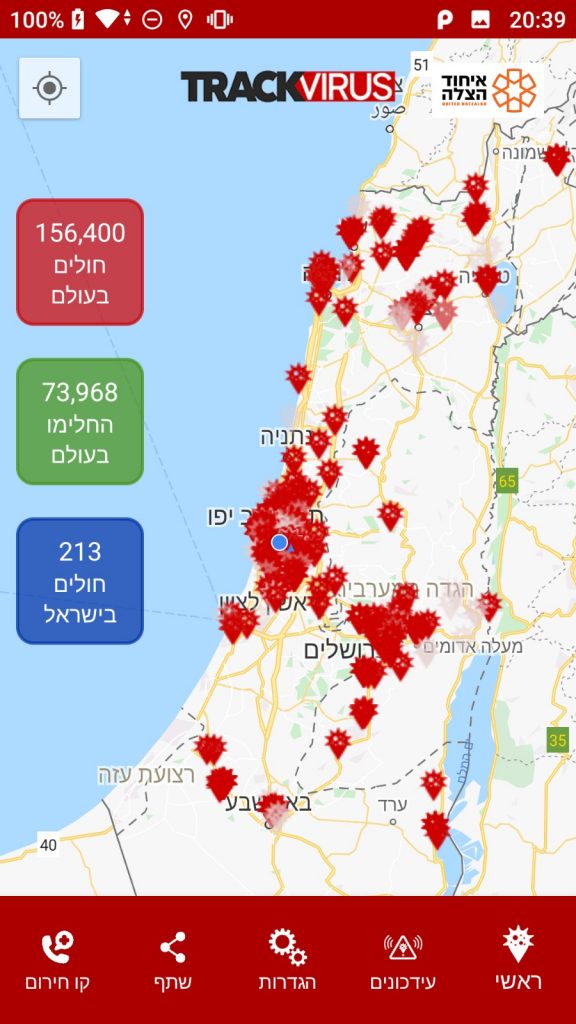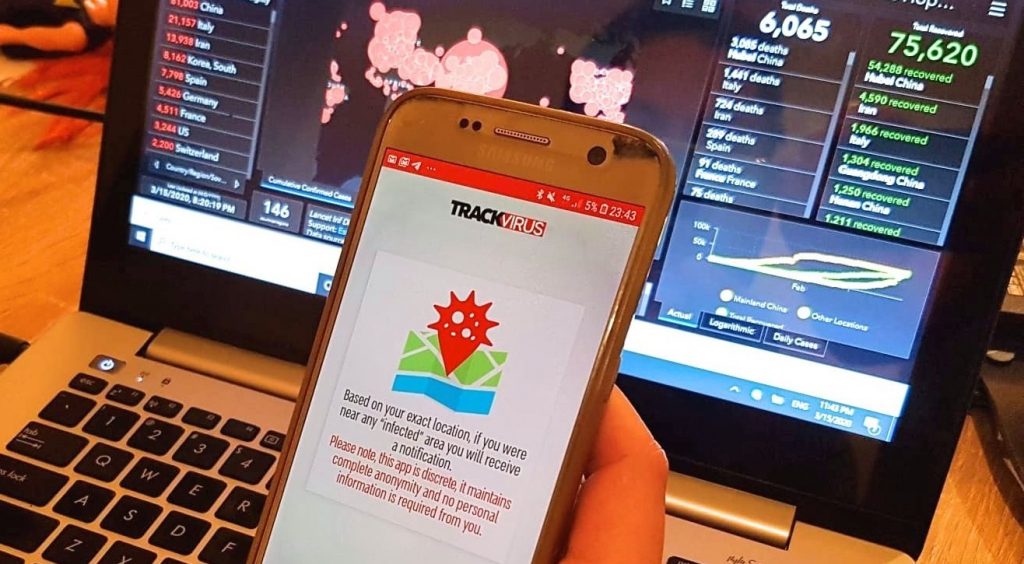UPDATE: As of March 19, Israel has 529 confirmed coronavirus cases, over 50,000 people are in verified quarantine, and the country is on partial lockdown.
A newly released Israeli app will notify users if they’ve crossed paths with a person confirmed to have tested positive for COVID-19, the disease caused by the novel coronavirus currently raging across the world.
The app, Track Virus, sources data collected by the Israeli Health Ministry which conducts interviews with confirmed patients on their whereabouts and releases the information publicly to help stem the spread of the coronavirus in Israel. The country has 213 confirmed cases as of March 14, according to ministry data, and some 45,000 people are currently in quarantine either because they had traveled abroad or came into contact with someone diagnosed with the disease.
Israel has taken some of the farthest-reaching measures outside of China, the epicenter of the coronavirus outbreak, to help curb the rate of infection in the country. Since late January when the World Health Organization declared a public health emergency, Israel has curbed international travel, barring entry to non-citizens from a number of Asian and European countries, and ordering mandatory hospitalized or home quarantines of 14 days for anyone arriving from abroad. The country has also banned social gatherings of more than 10 people and ordered all kindergartens, schools and universities shut, as well as public venues such as malls, restaurants, gym, theaters, among others.

Each confirmed case in Israel is investigated and while the person’s name is not released, their whereabouts – including dates and times – prior to the diagnosis are publicized widely in official government announcements and in the media. This is done to alert others who may have come into contact with them and who are then tested or ordered into 14-day home quarantine.
The new app seeks to simplify this process and minimize the guesswork, as well as limit the anxiety over possible encounters. It works by crosschecking a user’s path with the paths of confirmed coronavirus patients as listed by the Health Ministry. Should a user have been at the same location frequented by a confirmed patient, they will receive a notification letting them know (this works from the moment a user downloads the app, and not retroactively).
The information, the developers stress, is anonymized and is not uploaded to the cloud, and the app does not prompt for any form of identification though users do grant geolocation permissions for their smartphones.

Released late last week, Track Virus is the brainchild of Ori Fadlon, a former social media manager of Maccabi Tel Aviv FC, who partnered with Israeli software development company PandaOS to roll out the app quickly
“We did three-four months’ worth of work – development, design, programming – in a matter of three-four days but the urgency was real and it all happened very quickly,” Fadlon tells NoCamels in a phone interview.
The app currently has over 75,000 downloads and that number is growing fast, he says. It is available in Hebrew and English for Android users and will soon be rolled out on iOS.
“We’re doing this to help people, to save them. It’s for the good of society,” Fadlon explains.
Track Virus partnered with Israel’s United Hatzalah, a volunteer-based emergency medical care organization, to help track information coming in from the Health Ministry.
“As the number of coronavirus patients rises the harder it becomes for the public to keep track of all the different places that they have all been and the updates from the Health Ministry. Additionally, people often have a hard time recalling exactly where they have been and when. The app solves both of these problems,” said United Hatzalah VP of Operations Dov Maisel in a statement.
Tracking and privacy

Fadlon acknowledges the privacy concerns that come with using advanced smartphone tech but stresses that information obtained through the app is anonymous and is not stored on a cloud-based central system. “In this day and age, privacy is very important to us and we take it very seriously,” he says.
The developers are not notified if someone gets an alert unless that person contacts them, he explains.
Fadlon tells NoCamels he and his co-founders are currently fielding 20-30 inquiries a day from state agencies, investors, business development professionals, and others, especially from abroad.
“We’ve received emails from California, Florida, Italy; we even got one from Iran,” he says. The questions center around whether the app will become available in other countries and in other languages.
As of March 14, over 162,000 people in 146 countries worldwide have contracted the virus and more than 6,000 people have died. The majority of the cases have been in mainland China’s hardest-hit Hubei province, but Italy has seen a major outbreak in recent weeks with over 20,000 confirmed cases and over 1,400 deaths.
Track Virus is currently working on an Italian version, Fadlon tells NoCamels.
Sign up for our free weekly newsletter
SubscribeIsrael okays surveillance tech to track coronavirus patients
Separately, in a new measure approved on Sunday night, the Israeli government has given its initial okay to a proposal allowing the Israel Security Agency, the country’s internal security service also known as the Shin Bet, to be able to track Israelis’ phones without needing a court order as part of the country’s effort to stop the spread of the coronavirus.
The Prime Minister’s Office said the cabinet held “lengthy discussions” on the matter and that PM Benjamin Netanyahu asked that a number of reservations be added to reduce “the scope of the information, the scope of those with access to it, and to ensure that this information would not be used except in the struggle against the coronavirus.”
The measure still requires the approval of a Knesset subcommittee on the country’s clandestine services, and if given the go-ahead, will be valid for no more than 30 days from the time of approval.
The PMO stressed that the Shin Bet would not take part in enforcing quarantine or quarantine procedures.

So far, police have launched investigations of 21 Israeli residents suspected of violating the terms of their quarantine. Police have also taken action against 14 places of business, including restaurants and bars, that have violated directives to disallow mass gatherings, according to a joint statement by the police and the Health Ministry issued Saturday night.
Netanyahu signaled in a televised press statement on Saturday that such a measure was indeed needed to help retroactively track the movements of confirmed patients.
Israel is currently at “war with an enemy that is invisible, and that is the virus, the enemy is the pandemic, and to win – and we can win – it depends on the steps we take,” Netanyahu said in the press conference.
“Like in every war, we have to track the enemy. And we can do this by tracking those who are ill. We will deploy all the means at our disposal, including…technological means,” he said, that were previously “used to fight terror.”
“I’ve avoided using these means in the general public, but now we have no choice. We are in a war that forces us to take unusual steps,” Netanyahu said, adding that the request for technological tools came from the Health Ministry itself and that the Justice Ministry has been consulted.
“It’s not simple, there is some infringement to the privacy of those people whom we need to track – who they came into contact with, where they were prior, what happened after. It will give us a very effective tool to track this enemy, this pandemic, and to isolate it,” Netanyahu insisted.
Israel, he said, “is one of the few countries with this capability, and we will use it.” As an example, he pointed to the “great success” of the Taiwanese authorities who employed similar measures to fight the coronavirus pandemic.
“We must do everything, as a government and as citizens, to not become infected and not to infect others,” said Netanyahu.
The measure has drawn some criticism.
Dr. Tehilla Shwartz Altshuler, a senior researcher at the Israel Democracy Institute, said in a statement that Israel may be in the midst of a national emergency, “but this doesn’t mean that turning Israel into a surveillance state is justified.”
“It is essential to collect data and publish warnings – but it is also essential to respect Israelis’ right to privacy; the government must restrict itself to the use of proportionate tools only. It is easy to infringe on rights – reinstating them – will be much more difficult,” she added.
Mass surveillance of the entire population must be prohibited, Dr. Shwartz Altshuler stressed. “Surveillance is only permissible: in order to verify and validate a verified patient’s information, in cases in which there are grounds to believe that the patient did not tell the truth in the course of an epidemiological investigation; to collect information in order to warn people who have come in contact with a verified patient; and to verify that quarantine orders are being upheld.”
She warned that to collect private information while protecting patients’ privacy, a number of conditions should be met. These include informing those citizens that their location or personal data is being tracked, creating a transparent process on how the government submit requests to cellular companies and the details that may be requested (exact location, relevant window of time), clearly defining who has access to the collected information and committing to maintain confidentiality while using the data solely to determine an individual’s movements and locating persons exposed to a verified coronavirus patient, and banning access to the entire police force.
Related posts

Editors’ & Readers’ Choice: 10 Favorite NoCamels Articles

Forward Facing: What Does The Future Hold For Israeli High-Tech?

Impact Innovation: Israeli Startups That Could Shape Our Future





Facebook comments